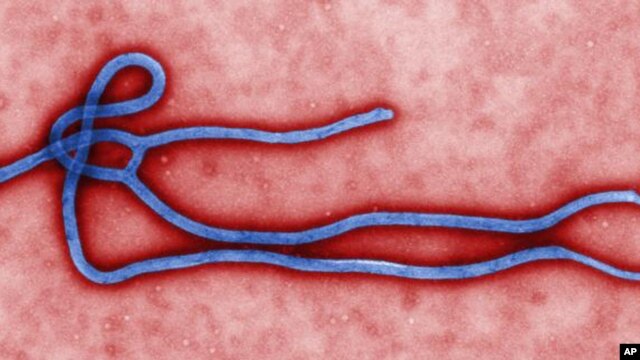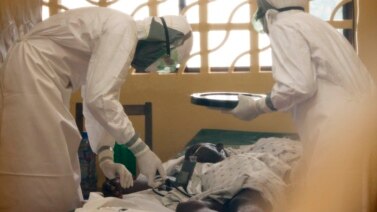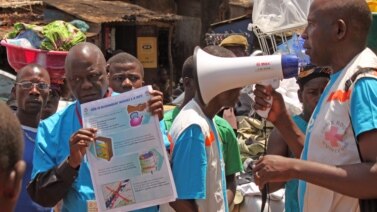
Last weekend, the president of Liberia announced measures to try to contain the Ebola virus. President Ellen Johnson Sirleaf said that her country is closing most of its borders. The few entry points that will remain open are Monrovia’s international airport, a provincial airport and three major over-land border crossings. She said all these entry points will have prevention and testing centers. She added that the Liberia Airport Authority will inspect all incoming and outgoing passengers. The government has also banned public gatherings and demonstrations.
In another development, health officials are attempting to identify who came into contact last week with a man who later died of the Ebola virus. Patrick Sawyer was 40 years old, and served as an advisor to Liberia’s Finance Ministry. Mr. Sawyer took a flight from Liberia to Ghana. He later changed airplanes in Togo for a flight to Nigeria, where he died last Friday. Witnesses said he was sick on at least one of his flights. He reportedly was vomiting and had diarrhea. The expulsion of food from the stomach, and body wastes are signs of the disease.
Patrick Sawyer was going to Nigeria for a conference. He planned to go to the United States to visit with his wife and children.
On Monday, Nigerian officials announced that they had identified more than 50 people who came into contact with Mr. Sawyer. But some fear many more may have had contact with him than is currently known.
Jide Idris is Health Commissioner in Lagos State. He says both the health and aviation departments are searching for other possible Ebola cases.
“We call on all Nigerians to be calm, and not panic and do hereby ensure them that both the state and the federal government are up in arms to ensure that the virus does not escape and that no Nigerian is infected with this virus.”
Ebola has killed about 700 people across West Africa this year. More than 1,200 others have been infected. Health workers say an outbreak in Lagos, Nigeria’s largest city, would be an almost unimaginable disaster.

Experts from the United States Centers for Disease Control and Prevention are in West Africa. They are working with government ministries and international organizations to follow the spread of Ebola cases.
In the past, the Ebola virus currently active in Liberia, Guinea and Sierra Leone killed 90 percent of those who got sick. The CDC says the death rate for the current outbreak is about 60 percent. Experts say this shows that early treatment is having an effect.
Stephan Monroe studies emerging diseases for the Centers for Disease Control. He spoke during a conference from the CDC’s headquarters in Atlanta, Georgia.
“We know how to stop the outbreak and that is to break the chains of transmission. And so what does that involve? It involves first identifying cases through active case findings, and then identifying all of their contacts -- who had contact with them during the time when they were symptomatic, and therefore are at risk of becoming infected themselves, and following those contacts daily for 21 days and if they do develop symptoms, to get them into one of these isolation facilities.”
Stephan Monroe says fear and misinformation are preventing some people from seeking treatment. He says what the CDC and health organizations are hoping to do is to find trusted members of the affected communities to publicize how to contain the disease.


